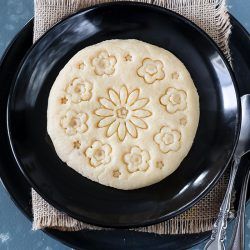With our step-by-step tutorial and a little effort, anyone can create rich and creamy mawa at home- the same taste and texture. Plus, each recipe is irresistibly good and mostly all done in 10-15 minutes of prep – it doesn’t get much better than that!
Therefore, to help you better, I have added 6 techniques in this post on – how to make mawa – 5 ways of making mawa. Although making mawa at home doesn’t require too many ingredients, the right ingredients and blending them in the accurate quantity is what creates that smooth and velvety textured mawa. Mawa is a coagulated milk solid that is widely used in Indian cooking. It is the base for many Indian/South Asian recipes ranging from sweets to savory dishes. Traditionally khoya/mawa is prepared by simmering full-fat milk for hours over a medium flame. Milk is reduced to one-fifth of its volume by removing its moisture content through a slow cooking process. Ater this evaporation, milk reaches its semi-solid stage, and all that is left behind is a creamy, nutty-flavored dough-like milk solid, and that is Mawa/khoya/Kharra.
Therefore, I have come up with simple methods to prepare mawa at home without compromising authenticity or taste. The richness and texture of homemade mawa is far better than the store brought one. All the techniques shown below are pretty straightforward, and you can have instant khoya ready in minutes. So if you have busy schedules like me yet want to enjoy homemade mawa, you will surely love all my ways to make mawa at home. Follow the step-by-step guide below on how to make dense yet moist, decadent mawa at home.
» Hard Khoya- Also known as batti khoya. Batti means brick in English; therefore, this is a very firm and rock-solid kind of khoya. In this process, milk is reduced to 1/5th of its volume by removing its moisture content through a slow cooking process. Batti khoya can be crumbled or grated like cheese and is used to prepare pedas, burfis, and ladoos. » Soft Khoya – Also known as Chikna Khoya, Hariyali khoya, or Daab ka khoya. This mawa is soft and squishy in texture and contains plenty of moisture. It’s cooking process is stopped a little earlier than the normal mawa. This mawa is an excellent addition to rich gravies like shahi paneer, shahi kofta and can also be added to sweets like Gulab Jamuns and Gajar ka halwa. How to make mawa – 5 ways of making mawa » Granular Khoya – Also known as danedar Khoya. It’s grainy in texture and is soft and looks like curdled milk. Its moisture content is in between the hard mawa and soft mawa. It is soft and grainy in texture and is used to make kalakand and granular burfi. » Milk powder – Since milk powder is the building block to a creamy mawa, I recommend using the best quality milk powder. I have used NOW Foods, Organic Non-Fat Dry Milk Powder for this recipe. Use this wherever the recipe calls for milk powder. The other best option is Nestle Nido Instant Dry Whole Milk Powder. » Heavy whipping cream – Ensure the cream you use has at least 35% of the fat; otherwise, our mawa will not attain a rich and creamy texture. » Ghee – a little goes a long way. A tablespoon of ghee is all you need in most of the techniques to create creamy mawa. » Yogurt – Use plain greek yogurt or thick curd. How to make mawa – 5 ways of making mawa » Ricotta cheese – Use whole milk ricotta cheese for the richest and creamiest homemade mawa. Do not substitute it with low-fat ricotta cheese. Ho » Sweetened condensed milk – required only in sweet-tasting mawa. Mawa #1 and Mawa #4 uses condensed milk.
» All the below-mentioned recipes are made in the microwave (except mawa#5); however, all the microwavable techniques can easily be adapted to the stovetop version. Cooking time may vary. » The below-mentioned recipes can be scaled up or down to suit your preference. However, if you decide to double the recipe, the cooking time may vary. Refer to each stage’s visuals to attain the right texture. » If you plan to make mawa #1 or Mawa #4, you will end with a beautiful dark tone mawa because sweetened condensed milk lends a darker shade to the mawa. This mawa has a slightly granular texture and has a rich nutty flavor.
Paneer also referred to as Cheena, is an Indian cottage cheese made by curdling milk with an acid like lemon juice or vinegar. The curdled milk solids are drained through a double layer of cheesecloth, then allowed to set by weighing it down with a heavy pot until all the liquid is drained and it becomes firm. On the other hand, khoya is prepared by simmering full-fat milk for hours over a medium flame. Milk is reduced to one-fifth of its volume by removing its moisture content through a slow cooking process. Transfer the cooled mawa to an airtight container and store it in the fridge for 3-4 days. Mawa can store in the freezer for up to 2 months. When ready to use, thaw mawa/khoya overnight in the refrigerator. The next day, crumble the softened mawa and use it as directed in the recipe. A few of my favorites where I use mawa are- Should you make any of the methods below, please leave me a comment below, and don’t forget to share it with your family and friends.




















































































































